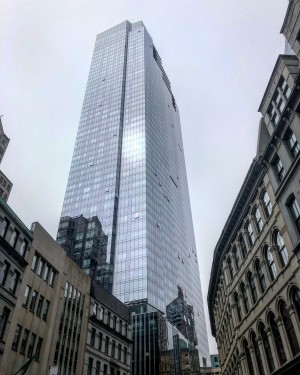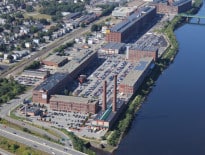Anecdotal evidence that many of Boston’s newly built luxury condos sit unoccupied as part-time residences or “wealth storage lockers” for out-of-town investors is bolstered by the findings of a new housing market study.
The Washington, D.C.-based Institute for Policy Studies said 64 percent of the 1,805 units in a dozen newer luxury developments aren’t claiming the residential exemption on property taxes. The group favors a transfer tax on transactions over $2.5 million and using the proceeds to subsidize affordable housing.
“There is a huge transformation under way not just in the skyline, but in the demographics of Boston in certain neighborhoods,” said Chuck Collins, director of the institute’s program on inequality and the common good. “Our report is an attempt to raise the flag and say, ‘Is this who we want to become? Who is Boston for?’”
The findings rekindle a debate over whether luxury developments help control local housing costs by adding supply, and whether new taxes and fees on luxury properties should subsidize affordable and workforce housing.
While acknowledging the benefits of the housing boom on construction employment and tax revenues, the institute’s “Towering Excess” report warns of increasing social stratification and potential for money laundering through property transactions.
Cities including New York and San Francisco have enacted transfer fees in recent years on big-ticket residential transactions, and Somerville is seeking to do the same through a home rule petition requiring legislative approval.
The report also calls for a “vacancy tax” on high-end properties that are vacant more than half the year, and recommends owners be required to disclose their financial interest on deeds.

Steve Adams
Unoccupied Condos, Anonymous Ownership
Using Boston assessors’ data, the IPS report analyzed the number of luxury condos with owners who don’t claim the residential exemption tax abatement in a dozen major new developments, and the number of units owned by corporations or trusts. Average sales prices in the buildings studied exceed $3 million.
Nearly two-thirds of the 1,805 units did not claim the residential exemption, including 88 percent of the condos in Le Jardin and 82 percent at the Mandarin Oriental. At the 443-unit Millennium Boston tower, 158 units are owned by trusts and limited liability corporations, which are not required to disclose ownership.
The lack of transparency makes real estate investments an ideal mechanism for money laundering, IPS’ Collins said.
Boston Mayor Marty Walsh said he’ll analyze the report, but questioned whether high-end development has an effect on housing prices elsewhere in the city.
“We’re seeing a problem where people are losing apartments in Boston. I’m not sure how much a Millennium Tower $20 million condo is affecting somebody’s housing stock in Dorchester, but it’s something we have to look at,” Walsh said last week.
The city has imposed new affordable housing requirements under Walsh’s administration. A revised inclusionary development policy which took effect in 2017 increased fees on developers who don’t include income-restricted units in projects, and it set higher minimum affordable housing requirements in the city’s pricier housing markets.
Boston voters also enacted the Community Preservation Act in 2016, which imposed a 1 percent property surtax effective July 2017 for affordable housing
Walsh has set a goal of generating 53,000 new housing units citywide by 2030, and the Boston Planning and Development Agency has approved more than 27,000 housing units since January 2014, according to BPDA data.
“I’m focused on building low-income and moderate-income housing and that’s what we’re focused on in the city,” Walsh said. “We inherited a housing shortage. It’s no one’s fault: it’s Boston’s popularity. People were moving out in the 1970s and ’80s and now that’s not the case. The positive side is we’ve changed the IDP to get more money, and we’ve been able to invest a lot more money into affordable housing.”
The BPDA in June approved an 8 percent increase in linkage fees paid by commercial developers to support housing production, to $9.03 per square foot.
In Somerville, Mayor Joseph Curtatone is backing a home rule petition that would impose a 1 percent fee on both buyers and sellers in residential transactions involving real estate trusts or limited liability companies. The fee would not apply to transactions between family members, or properties used as primary residences for the past two years. Proceeds would go to the city’s affordable housing trust fund.
Rep. Michael Connolly, D-Cambridge, has twice filed legislation since 2017 that would enable all Massachusetts cities and towns to enact similar provisions without having to seek special legislation. Connolly’s bill would let communities set a transfer fee ranging from 0.5 to 2 percent on all real estate transactions. Communities would have the option of exempting some populations and transactions below the previous 12 months’ mean purchase price.
“In this context where values are doubling and tripling in very small amounts of time, can we as a community say we’ll take 1 or 2 percent and keep it in the community?” Connolly said.
After holding a hearing on “high-end blight” caused by unoccupied luxury units last spring, the Boston city council expects to revisit the topic this fall.
Councilor Lydia Edwards, who chairs the housing and community committee, said the current regulations aren’t stemming displacement or controlling housing costs.
“We’re just looking at who we are not protecting. The new units coming online, many of them are not accessible by Bostonians,” Edwards said. “They seem to be owned by people who don’t live here, and the report really demonstrated that.”




 |
| 

